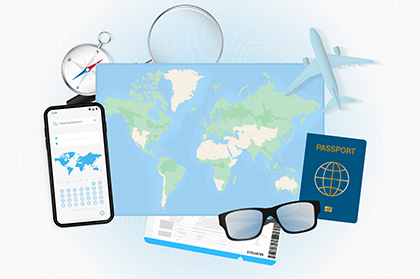Top Nursing Courses in Australia for International Students
Here are a few reasons WHY you should consider studying nursing and embark on your path to a successful career. Australia is...
Australia is the most popular education destination for Nepalese students planning to study abroad. Initially, students might have a lot of queries regarding student visa application and processing.
Here students planning to study in Australia can access and obtain detailed information regarding the study visa application process to Australia.
Steps involved during Australian Student Visa Subclass 500: –
Let’s have a detailed discussion on what happens during each of these steps in the process of applying student visa and the documents required.
Most students are often overwhelmed with the idea of studying and/or working abroad, as well as the consultancy that can best help them. Career counselling is the most important step as it is where decisions-making starts. A student may have not seen much of the world, has limited access to information and is often confused while decision making. Our Qualified Counsellors will guide you to take the right career path after analysing your strengths and weaknesses.
So, to have an insightful career counselling session, book an appointment with our VEVS Counsellor, so that they can help you discover the most suitable study and career plan for you.
The second step involved in the process is English language test preparations. IELTS/ PTE is popular among students planning to study in Australia. After completing your test preparations, book the test (IELTS/ PTE), and appear for the test. Once you achieve the required results, you can use them to apply for admissions.
The actual scores required can differ depending on your educational institution and your desired course of study. For example, degrees related to law, teaching, and medicine will have higher English language requirements.
Before applying for admission, you have to go through a verification process where our experts do a detailed review of your academic documents and suggest what additional documents are required before applying for your admission to the particular university/college and course of study.
These documents are then compiled and submitted by our team to the college/university for assessment. Each education provider has its own documentation requirements, but generally, you will need to provide the following documents:
Your university/college will issue an offer letter to you if they are willing to take you on as a student. The offer letter contains critical information such as course description, orientation date, course commencement date, campus location, course fee, mode of study, total tuition fees, and semester deposit amount.
It will also contain instructions on how you can accept this offer, and the process involved to secure a Confirmation of Enrolment (COE). Generally speaking, payment of tuition fees (or a portion of) is required as part of the COE process.
It should be noted that for this payment, you will require a NOC (No Objection Letter) from the Ministry of Education, Keshar Mahal.
After obtaining your NOC, provide your offer letter and NOC letter to the bank. The bank will transfer the required amount to your education provider for COE processing.
As you can see, there are many steps involved in the admissions stage alone. The Processing time for offer letter and COE can also vary depending on the education institution and the timing of application. You should always start early and talk to our consultant for planning.
Once we receive your COE, we can formally commence your student visa application process. The most important part of a student visa application is Genuine Temporary Entrant (GTE).
GTE stands for Genuine Temporary Entrant. It is an integrity assessment that applicants for student visas must provide to prove their intention to study in Australia and not to settle there.
All student visa applicants must demonstrate that they are coming to Australia on a temporary basis. Their purpose of the visit is to upgrade their education and qualification for a better career in the future. As per Ministerial Direction 69, when case officers from the Department of Home Affairs (DHA) assess this criterion, they will focus on the following:
You should address this criterion by starting with a GTE statement, also known as SOP (Statement of Purpose). In addition, you should provide as much supporting evidence as you can to back up your GTE statement.
Once you have your GTE statement and all other required documentation ready, you can submit your visa application online. Our expert consultants can guide you on all documents required in further detail, once they understand your situation better.
Upon completion of the online lodgement of your visa application, you will receive the following documents for your records and immediate action:
Student visa processing time can vary greatly depending on your course of study, how decision-ready your application is, and how complicated your application is. This is why you should book an appointment with our visa experts to plan for your student visa application and lodgement.
Once your visa application is allocated to a case officer at Department of Home Affairs, they will assess it against migration regulations. They can either request additional documents from you or make a decision without asking for further information. Whether it’s approval or rejection, the case officer will inform the decision to you formally in writing.
If your visa application is approved, you will receive a visa grant notification containing important information such as your visa expiry date and visa conditions. Third parties such as airline staff, your prospect employer, education provider, etc. can check your visa status online with your consent, utilizing Department of Home Affairs’ VEVO (Visa Entitlement Verification Online) system.
You can also check your own visa status here: https://immi.homeaffairs.gov.au/visas/already-have-a-visa/check-visa-details-and-conditions/check-conditions-online
After getting Student Visa for Australia, you should take all necessary processes before flying to Australia. At VEVS Global Nepal, we guide you for pre-departure briefing which intends to address the Dos and Don’ts right from getting your Visa, shopping, travelling, finding accommodation, jobs, and many other aspects that are important to be aware of.
Many congratulations to all visa-granted students, may all your abroad study dreams come true.
Read blogs about all aspects of living, studying and working in Australia.

Here are a few reasons WHY you should consider studying nursing and embark on your path to a successful career. Australia is...

What is the best way to receive an Australian PR from Nepal? If you are considering permanent residency in another nation from...

If you're thinking about applying for a PR (Permanent residency) in Australia, don't give up. It's a fantastic idea for your future....

Travel to Australia from Nepal Coral reefs, gorgeous sandy beaches, and some scary creatures come to mind when we think of Australia....